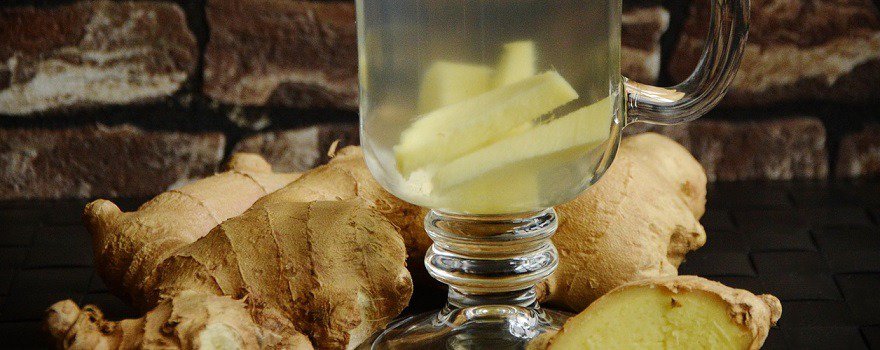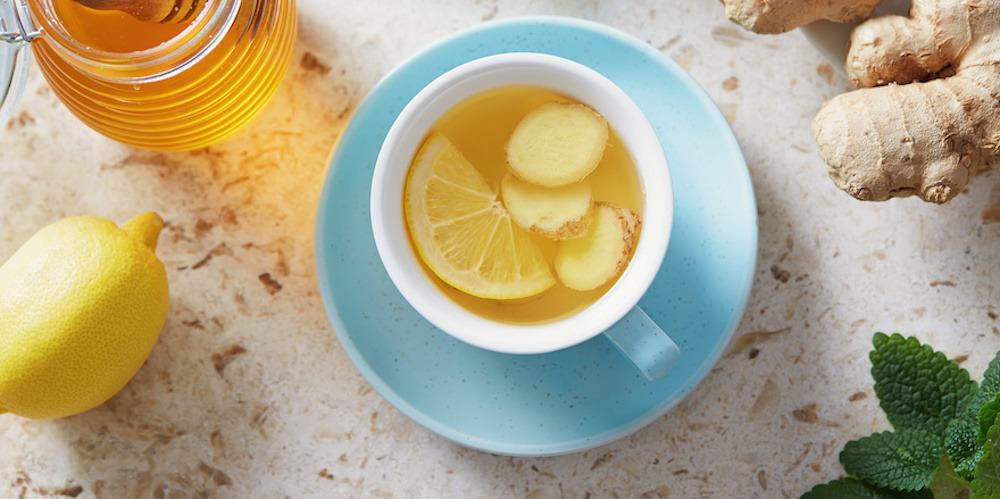Ginger tea, an excellent natural remedy
The ginger rhizome: superfood
Ginger is a superfood par excellence, as it has both nourished and healed for millennia. Its usage dates back over 5,000 years, in both traditional Chinese medicine and Indian traditional medicine, Ayurveda.
Ginger is used to maintain good health and ward off fatigue, as it is one of the richest foods in antioxidants, an excellent anti-inflammatory, and a good source of vitamins and trace elements.

This root is also a “natural medicine” to fight fever, colds, and chills, as well as nausea and vomiting. It is a good ally against digestive issues and a natural fat burner to help with weight loss.
How to consume ginger?
Ginger can be consumed fresh or dry, in the form of a root or powder. It can be easily incorporated into cooking as a spice to give dishes an Asian touch. However, some people may prefer to consume it as a dietary supplement (capsules or ampoules).
If you like the spicy and warm notes of ginger, it would be a shame to deprive yourself of it! One of the best ways to consume ginger is in the form of tea.
Ginger is not cultivated (or very rarely) in our latitudes. The ginger found on our shelves typically comes from China or India, the largest ginger producers in the world. It is preferable to buy organic ginger to avoid pesticide residues harmful to our health.
Ginger, a remedy known for centuries
Traditional Chinese doctors prescribed ginger as a tea or to chew on to treat fever, colds, stop coughing, and treat food poisoning. In the West, ginger has also been known for its medicinal properties for centuries. In the 12th century, the famous naturopath Hildegard of Bingen already stated: “if you are dry and already quite weakened, grind ginger into powder and take it in a drink. You will thus improve your condition“.
In Ayurvedic medicine as well, ginger is one of the basic spices for preparing teas. It is one of the main ingredients of the famous spice blend masala in India.

While ginger juice is ideal for high temperatures because it refreshes as much as it energizes, ginger tea is perfect for the cold. It warms the body’s internal temperature.
How to prepare ginger tea?
Fresh or dried ginger for tea?
You can prepare ginger tea with fresh root (or rhizome) or with ginger powder. Here’s how to proceed.
If using fresh ginger root, for one liter of tea, use about 5 cm of root, which you grate or finely chop. To draw the maximum virtues from the plant, it is ideal to make a ginger decoction rather than tea, which is more suitable for root plants.
Therefore, heat a liter of water in a saucepan, throw in the grated ginger, and continue to heat on low for 20 minutes. Remove from heat and let it steep (and cool) for 15 minutes.

You can also use ginger powder to prepare a tea, with 2 teaspoons of powder for a liter of water. In both cases, strain before consuming hot, warm, or cold. Ginger powder tea will be less spicy than fresh ginger tea. In short, it all depends on your taste and preferences, but also on your health condition.
When and how to consume ginger tea?
The ginger tea can be consumed at any time of the day. However, one should not consume more than 4 cups per day to avoid undesirable side effects. Indeed, consuming ginger in too large quantities can lead to digestive disturbances (heartburn, mild diarrhea).
It is also advisable to avoid drinking ginger tea in the evening due to its anti-fatigue effect, which can cause mild insomnia.
In case of fatigue and a general dip in energy, ginger tea is ideal. The “warming” effect of ginger and its anti-fatigue action, as well as its effectiveness on blood circulation, have earned ginger a reputation as an aphrodisiac. While no scientific study has confirmed this effectiveness, it’s always worth trying in case of low libido!
Ginger infusion is also recommended for cases of nausea and vomiting, whether due to motion sickness, pregnancy, or post-operative conditions. In these instances, it’s preferable to consume ginger tea in small quantities to prevent regurgitation, multiple times a day, or as soon as nausea signs appear.
For digestion problems and for those looking to lose weight, ginger is a good ally. In this case, a large cup of tea is consumed before each meal. The infusion will not only aid in better digestion but also help to regulate appetite and eliminate fats. Indeed, ginger’s manganese richness makes it a good fat-burner as it helps the body synthesize lipids and carbohydrates.
Finally, ginger infusion is effective against all the winter ailments: minor sore throats and flu, fever, cold, sore throat… Consume the infusion at the first symptoms (runny nose, cough…) and for a maximum of two weeks.
Enhancing your ginger tea
To maximize the effect of ginger or just for pleasure, honey and lemon can be added after the root has infused. They not only help to soften the spice of ginger but also have proven antiseptic and antibacterial properties.
You can also buy or make your own energizing ginger teas by adding, for example, turmeric or cinnamon. You can get inspired by Ayurvedic recipes to make your own ginger teas at home with fresh spices: try, for instance, the spice mix of the famous Indian masala chai, with ginger, cardamom, star anise, pepper, cinnamon, and cloves. It’s delicious!



